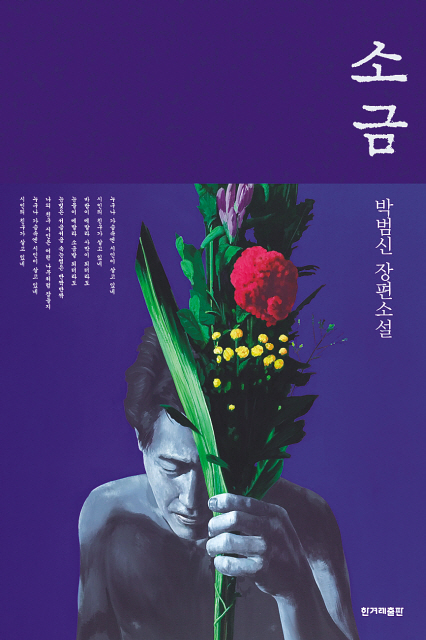Sacrifices, sins of the father
Park Bum-shin’s 40th novel ‘Salt’ portrays aging fathers as victims
By Claire LeePublished : May 9, 2013 - 19:29
After the film adaptation of his 2010 novel “Eungyo”― a tale about a 70-something poet falling for a teenage girl ― created much hype even before its release, author Park Bum-shin in 2011 moved alone to his hometown Nonsan, South Chungcheong Province. He wanted to write in solitude, away from public attention.
His latest novel, “Salt,” is a product of Park’s two years of seclusion. A story of an isolated, agonized father and his dysfunctional family, the novel again explores the theme the writer has focused on for many years: the “violence of capitalism.”
His latest novel, “Salt,” is a product of Park’s two years of seclusion. A story of an isolated, agonized father and his dysfunctional family, the novel again explores the theme the writer has focused on for many years: the “violence of capitalism.”

His 2010 novel “Business” was about a desperate mother who becomes a prostitute to pay for the private education costs of her children. In 2011, he published “My Hand Turns into a Horseshoe,” a grim portrait of a former prisoner who cannot manage to escape poverty.
The 67-year-old, in fact, was inspired to write “Salt” after re-reading the epilogue of his 2010 novel “Business.”

“I wrote: ‘I believe literature must persistently speak up about the violence of capitalism that is affecting the lives of everyone in this world,’” Park writes in his message to the readers of “Salt.”
“What I wrote really hit me, and inspired me to do what I am supposed to do: to continue writing.”
The novel’s protagonist, Seon Myeong-woo, is a diligent, dutiful father who works hard to support his three daughters. He works for a big corporation, and is always stressed by the workload and competition. His unloved wife, Hye-ran, is portrayed as a pretentious, materialistic woman, who raises her daughters the way her affluent parents raised her.
The controlling wife, who was cut off by her parents for marrying the young penniless Myeong-woo ― he was born to a poor salt maker in the countryside ― showers her children with expensive clothes and brand-name bags, while insisting they receive pricey private tutoring. Myeong-woo is overwhelmed by their spending habits, which exceed what he earns.
None of the daughters are interested in learning about Myeong-woo’s life outside their house and hardly appreciate his presence at their lavish parties and dinners. He feels like a “machine” that only functions to bring his family money. The girls’ lifestyle suffocates the father, who later is diagnosed with pancreatic cancer. Tormented, Myeong-woo eventually decides to leave his family for good on his youngest daughter’s 20th birthday.
Park unambiguously criticizes Myeong-woo’s three daughters for their selfishness, ingratitude and financial dependency. They go through a series of horrific events, including a financial disaster, after Myeong-woo leaves them. They are depicted rather harshly and graphically in an almost-condemning manner ― as if they deserve to suffer.
In later chapters, Park bluntly criticizes the modern Korean capitalist system and the younger generation, for exploiting their fathers’ youth and neglecting them as they grow older.
“The children are not expected to financially support their aging fathers (while fathers are expected to support them no matter what),” he writes in the novel. “They say society should look after them, since they don’t have the money or the resources. They call it public welfare to build more nursing homes. It certainly is an utterly unfair deal, but fathers are expected to tolerate it only because they are ‘fathers.’ The biggest sin of an aging father is that he is no longer productive.”
The book also criticizes the traditional blood-tie-oriented culture of the country. In the novel, Myeong-woo is never fully appreciated by his biological siblings and children. His abusive and poor older brother, especially, constantly tries to take his money ― arguing it is Myeong-woo’s “duty” as the most educated member of the family to support everyone in the household. It is his biological family that prevents him from being his own person, while those with no blood ties to him surprisingly offer the kind of things he had been yearning for all his life: love, care and attention.
The novel is an entertaining read, as Myeong-woo’s past, including his unwanted marriage to Hye-ran, as well as his present-day whereabouts are kept a mystery in the beginning. It almost reads like a solid mystery fiction.
However, Park overly romanticizes the protagonist ― Myeong-woo and the “fathers” born in the ’40s’ and ’50s ― as ever-sacrificing victims. Myeong-woo did not have to live like a money machine, and he did not have to force himself to accept his wife’s parenting method and lifestyle.
While living with his wife and children, he hardly makes an effort to save his troubled marriage or his dysfunctional relationship with his daughters ― for which he is also partly responsible.
And most importantly, no baby is born by their own will; more often than not, becoming a parent is a choice. For this very reason, Park’s obvious resentment toward the younger generation seems rather unpersuasive.
By Claire Lee (dyc@heraldcorp.com)







![[Weekender] Geeks have never been so chic in Korea](http://res.heraldm.com/phpwas/restmb_idxmake.php?idx=644&simg=/content/image/2024/05/16/20240516050845_0.jpg&u=)


![[Herald Interview] Byun Yo-han's 'unlikable' character is result of calculated acting](http://res.heraldm.com/phpwas/restmb_idxmake.php?idx=644&simg=/content/image/2024/05/16/20240516050855_0.jpg&u=)






![[Herald Interview] Byun Yo-han's 'unlikable' character is result of calculated acting](http://res.heraldm.com/phpwas/restmb_idxmake.php?idx=652&simg=/content/image/2024/05/16/20240516050855_0.jpg&u=)
